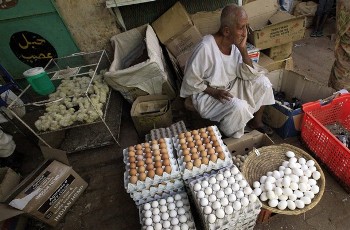Sudan inflation declines to 39.2% in September: report
October 13, 2014 (KHARTOUM) – Sudan’s Central Bureau of Statistics (CBoS) said the monthly inflation rate has declined to 39.2% in September compared to 46.4% in August.
 The drop in inflation rate coincides with the increase in the value of the Sudanese pound against the US dollar.
The drop in inflation rate coincides with the increase in the value of the Sudanese pound against the US dollar.
The monthly inflation rate edged upwards in the month of July to 46.8% from 45.3% in June and 42% in May.
The CBoS attributed the decline in inflation rate to the decrease in the average price of four consumer goods groups including meat, bread, grains and legumes and vegetables which amounts to 36% of the total consumer spending.
The CBoS September’s bulletin on inflation rate pointed that price of the rest of the goods in the food and drinks group has witnessed relative increase, saying the price index of the food and drinks group has declined by 2.5% compared to August.
The director of the domestic trade and prices department at the CBoS, Asia Mohamed Khalil, said the decline in inflation rate was a result of the decrease in prices of the food and drinks and meat group.
She told the government-sponsored Sudan Media Center (SMC) website the average price of meat in the states declined by 4.5% while the price of grains declined by 2.2% besides a 5.4% decline in prices of legumes and vegetables and 4.3% in fruits prices.
Khalil pointed out that drop in the value of the US dollar has contributed to decreasing inflation rate in the country.
The exchange rate of the US dollar dropped on the black market in Khartoum in the last couple of weeks settling at 8.66 Sudanese pounds (SDG) compared to 9.50 (SDG).
Traders in the black market had previously told Sudan Tribune they expect the dollar price to decrease to 8 SDG.
The Froex union said the dollar price has declined to 8.25 Sudanese pounds in the black market on Sunday, noting it is to its normal position.
The acting director of the Forex union, Eid Abdel-Moni’m, underscored full cooperation and coordination between the union and National Intelligence and Security Services (NISS) department of economic security to fight against traders in black market who seek to achieve personal gains at the expense of the economy.
Last month, the former undersecretary of the finance ministry, al-Sheikh Mohamed al-Meck, attributed the decline in dollar price to an increase in Forex inflow due to an increase in livestock exports to Saudi Arabia in addition to receiving South Sudan’s oil transit fees in the past few days.
He said the decrease will also result in a drop in the inflation rate and an increase in GDP growth, adding that the good rainy season will also contribute to an increase in agricultural production.
Sayed Ali Zaki, an economist, for his part said the decrease in exchange rate is due to NISS’s campaign against black market traders, as well as reduced Forex demand.
The official dollar exchange rate stated by the Central Bank of Sudan (CBoS) is 5.8 SDG.
Sudan’s economy was hit hard since the southern part of the country declared independence in July 2011, taking with it about 75% of the country’s oil output.
The Sudanese pound has lost more than half its value since South Sudan’s secession, pushing inflation rates to record levels given that the East African nation imports most of its food.
(ST)
